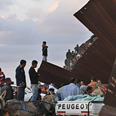
Crossing Rafah
Photo: AP
Yesterday morning, Israeli officials were still very angry at Egypt, after the observation posts and the pilotless drones started to relay surrealistic images of people pouring into Sinai. Officials here viewed this as yet another Egyptian slap in the face.
Again they did the same trick to us: We exert pressure in order to weaken Hamas, while they sabotage our strategy and close deals with Hamas behind our back.
Opinion
Ali Waked
First it was ‘green revolution’ in Gaza; now, Hamas able to end Israeli siege
By noon, Israeli officials still felt that the strategy of pressure levers had failed. We pressed a little too hard, and Hamas not only broke through the economic and diplomatic siege, it also scored international points and forced the pro-Western Arab regimes to show solidarity.
By evening time, the mood started to change. Some senior security officials started to like the situation: This is an exceptional opportunity to shift responsibility for the Gaza Strip to Egypt. Let them provide food, electricity, water, and fuel. The wet Israeli dream may come true.
After all, besides the Egyptian government, which shot itself in the foot, everyone is pleased: Businesses in Rafah are flourishing and in Gaza the price of a cigarette pack dropped by 80%. Israel has been presented with a golden opportunity for diplomatic gains: Yesterday, in fact, was the beginning of the real disengagement from Gaza.
Moreover, yesterday Hamas caused an absolute and complete disconnection between the Gaza economy and the West Bank economy, ahead of the emergence of two separate Palestinian entities. The moment huge quantities of goods entered the Strip without coordinating it with Israel, all duty agreements were in fact breached. From now on, Gazans would not be able to export even a matchbox to Israel or to the West Bank.
The weakest link: Egypt
The moment Israeli officials realized the picture may not be so grim, the decision was made to keep up the pressure: Fuel will continue to be supplied to the required minimum, based on the High Court’s decision; medicine and food will continue to go in based on last week’s parameters.
Defense officials reached the conclusion that it’s all about physics, and that Gaza is like a toothpaste tube. You squeeze it powerfully and the paste comes out of the weakest side – Egypt.
Yesterday it was Egypt’s turn to fall into the trap laid by one of the most sophisticated productions ever seen in the Middle East: Hamas wrote, directed, and produced it in conjunction with the Muslim Brothers and with their main channel – al-Jazeera. The target audience: The Arab world, Israel, the United Nations, and Europe.
After Hamas failed in exerting pressure through the Qassams, it shifted to shaping perceptions. Israel starred in the first act, the one with the “hungry candlelight kids.” Everything was filmed in advance: The Gaza parliament convening in the dark, hospitals collapsing, doctors begging for help. At the same time, protests that looked very impressive were organized and covered 24 hours a day on al-Jazeera.
The first to be moved were the moderate Arab states. Egypt started to be perceived as the weakest link. Cairo is concerned over the prospect of mass demonstrations over the rise of food prices in Egypt. Every day, Muslim Brothers activists are arrested and tried. The last thing Mubarak needs at this time is domestic charges that he is doing nothing in the face of the misery experienced by Gaza residents.
The moment Hamas realized Egypt was on the brink of collapse, it moved on to the second act: “Women with babies at the gates to Egypt,” tears, shots, water cannons, and wounded women. The Egyptians were distressed, and closed a deal with Hamas: At six thirty in the morning, “the gates shall be opened.”
Hamas blew up the walls and created an irreversible situation: There is no longer an obstacle – if the Egyptians want to prevent passage into their territory in the future they would have to rebuild the wall or shoot people.
Now, we are waiting for the third and fourth act. Should the Gaza siege be renewed, Hamas will renew its rocket attacks on Israel. When Hamas weakens diplomatically, it boosts its military activity.
Hamas has not yet said the last word in creating a balance of terror vis-à-vis the IDF. At this time, Hamas is planning some kind of special operation, which it will try to carry out.















